Getting a quote from a UK app developer? Try these 3 alternatives to common questions
In this article I talk about 3 common questions people ask UK app developers, and my suggestions for alternatives to help you get a better quote.
So, you've had a moment of inspiration and thought of a killer app idea. You've spoken to a few friends or colleagues and they all agree that it sounds great. What's next?
If you want to develop your idea into a mobile app or bespoke software, you'll need to talk to a software development company. That's where we come in. New clients often find us by searching for "bespoke software developers", or "uk app developers", read a few reviews, and decide to get in touch.
We're always happy when enthusiastic new clients contact us, full of energy, ready to develop their innovative app idea and take the App Store by storm.
But what questions should you ask to get the information you need, and how do you make sure you get the right service at a fair price? This article aims to help you get the most out of your free initial consultation — whether you've called us directly, or filled out our contact form.
Below you'll find three common questions that new software clients ask the team here at Codevate, along with my suggestions for useful alternatives.
Let me know what you think in the comments below. Or you can like/share your favourite part so I know what to write more about in the future!
1. What's the difference in cost for developing a simple app versus a complicated app?
It's definitely useful to try and find the starting price range for your app idea. But we'll need to make sure we're on the same page when it comes to what a "simple" or "complicated" app really is. So what makes an app simple to develop?
Is it about looks? Sometimes. Google looks pretty simple. It's just a box and a button, and if you press enter, you don't even need the button!

But behind the scenes is a whole host of automated programs like crawlers and spiders that gather data from all over the internet. They turn web pages into search terms, and then wrap all that up into a single page that helps you find anything on the internet. That's a massive oversimplification of course.
This question can be hard to navigate, as what's simple or complicated is subjective or a matter of perspective. There's often a lot of software features or functionality "below sea level", and the website or app in question is generally the tip of the iceberg.
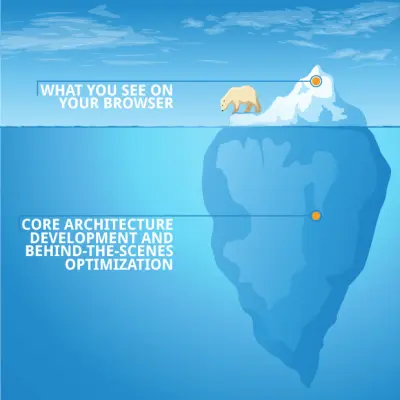
(Source: https://www.theuxdesigner.co.uk/blog/the-ux-iceberg)
A quick way to get on the same page is to link particular apps or websites online and point us to the feature that caught your eye. That way, we can get a feel for what you're looking for, and start to build a picture of how we might develop the software for your business.
It's important to give us the proper context so we can understand the answers you're looking for. The more specific you can be, the better. We'll want to know about your business, and the motivation behind developing the app you have in mind. If you have an estimated budget, feel free to let us know, as we can tailor our software proposal to match your budget and deliver as much value as possible.
My suggestion for a useful alternative would go something like this:
"My business is primarily [industry or services], but we're having problems with [issue], we think developing an app like [link to the App Store] might help, and that [specific feature] is right for us, but we'd like to change it by [changes you'd make]. [What would be a good starting budget for this app? / My starting budget is £XX,XXX.]"
A more specific example might be:
"My business deals with building security, but our clients won't buy our systems unless they can test staff temperatures.
We think developing a custom app like [competitor's temperature app] would work for us, but we want to add facial recognition, and automatically unlock the door to the building when the user has a normal temperature.
If the user has a high temperature, we want to provide health advice on the screen and notify their line manager. How much would it cost to develop the app?"
Perfect! Now we know what your business does, a similar app to what you want to develop, and the changes you'd need to customise the app for your business. You can contact us here if you're ready to rock and roll.
2. How many downloads did you get for the best mobile app you've developed?
It's important to know what success looks like. But does the number of App Store downloads tell you if your software developers did a good job on developing your app?
And what about those businesses who develop a custom app for internal use only?
The number of downloads your app gets can be a good metric if you want to measure marketing performance, but it doesn't tell you much about the software itself. As Codevate is purely a custom software development company, we don't handle marketing for our clients.
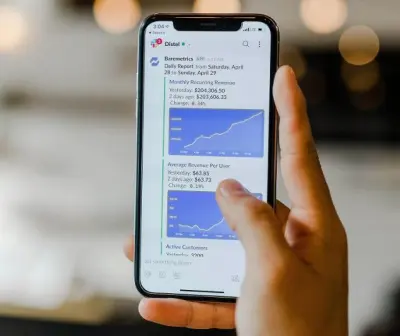
So, how can you figure out if your UK app developers are actually any good at developing apps? Or pave the way for a return on investment (ROI)?
I've laid out some alternative performance-related questions below:
i. How will my new app/software handle a sudden increase in downloads? (When my marketing team opens the floodgates.)
This question deals with software scalability and hosting. Depending on the app or software you're developing, a bespoke software company should be able to talk you through rough hosting costs and different options.
At Codevate, we've developed apps that have handled tens of thousands of users, and infrastructure that can auto-scale to handle even more. We always give a feel for hosting costs in our high-level proposals.
In terms of where we host your software, we often use Amazon Web Services, but we've used both Google Cloud Platform and Digital Ocean before too. You might call us "platform agnostic".
ii. How can we make [my business process] faster with bespoke software?
This is a great question if you're trying to get a feel for when you'll make a return on investment.
We'll need to know roughly how long each stage of your current process takes. Then we'll suggest some reasonable estimates for how much each stage will speed up. That way, you can calculate staff productivity or production cost savings and weigh up whether the software is a good investment.
Over the years, the Codevate team has digitised all sorts of business processes, often speeding them up with automation and more intuitive user interfaces. One client boasted an 800% increase in speed on their public transport process once the software was developed. Others are handling £11m+ in revenue in a single software platform.
iii. How much mobile data/battery will my app use?
It's important to know how much data your app will use. If your users run out of data, they might uninstall your app (or at the very least, won't be able to upload anything else in your app until they connect to WiFi).
When apps are developed for internal use, your business might want to consider how much data to get on its mobile phone contracts. Knowing the number of photos (and the photo quality), or the length of videos that will be uploaded is a great way to figure this out.
Some apps offer users an "only upload on WiFi" option, which can be great for giving consumers control.
Battery consumption is a different story, as every phone has a different sized battery.
Generally, apps won't use a massive amount of battery unless: they utilise particular features like GPS or Bluetooth; are using the camera to record and upload large videos; or "stay awake" when your phone is locked or doing something else. We'll be happy to talk you through the dos and don'ts — you can arrange a call by sending us a message here.
3. How much would it cost to develop an app like (Uber, Deliveroo, Instagram, ...)?
This question is quite similar to question #1, but I'm specifically talking about behemoth apps and international businesses here. This section provides a deep dive into the different kinds of thought processes needed when it comes to developing software at different scales.
I'm going to start off with a few of the assumptions that we might have to make in order to get you to that rough/ballpark app development cost. I'll follow that up with some related questions that we typically get asked, just to give you a bit more context and insight.
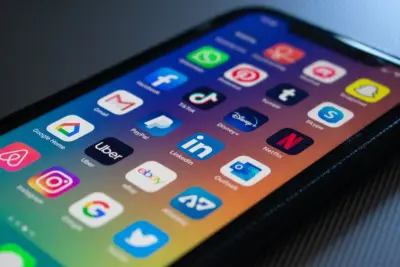
My main concern with a question like "How much does it cost to develop an app like Uber?" is that it oversimplifies your business and project, skipping over the nuances and USPs that differentiate you from your competitors. We need to know what makes your business tick, so that when we develop your app, we can focus on the important stuff.
Whilst we're happy to give ballpark costs for developing an app, this kind of question has to come with a pinch of salt, as uncertainty in project scope can be a big driver of software costs. We'll need to ask a number of questions to capture the finer details, or make some assumptions to fill in the gaps.
So, if all you put in your email enquiry is "How much does it cost to develop a bespoke app like Deliveroo?", we'll often have to do a bit of guesswork:
i. Without knowing your USPs or business nuances, we have to assume it's an exact copy.
This introduces a potential business-level problem. Why would someone download your app if it doesn't differentiate itself from your competitors'?
This would be much easier to follow up on a phone or Zoom call, but if you've dropped us an email then we'll have to exchange a few more before getting you the information you want.
If you think back to #1, context is everything.
ii. We have to assume that you'll be starting at the same scale that the app in question has already reached.
In reality, those overnight sensations you hear about in the news actually spent months or years developing their software in the shadows before finally making it big and becoming internationally newsworthy. The software likely started off much smaller and was crafted and improved over the course of time as their user base grew.
Of course, the barrier-to-entry for some software projects is bigger than others, and your "version one" might need to be a fully-featured heavy-hitter. Otherwise, your seedling project would be attempting to overthrow a mature, investor-backed (probably), established, international behemoth.
An example in the context of ride-hailing apps: there's a huge difference in technical challenges between supporting the circa 4,000 vehicles Addison Lee has in London versus the 14 million rides Uber has per day internationally.
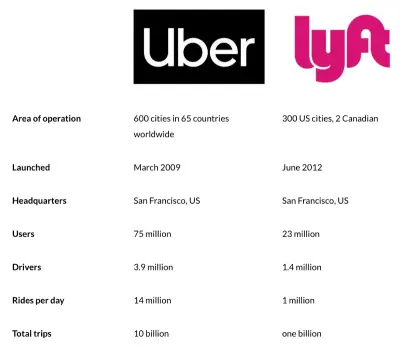
Most of the time, it's not financially or economically feasible to directly challenge an international tech giant (some of which are making billions in losses just to drive out competition). So it's important to get creative by developing high-impact, lean software (pre "version one") that delivers unrivalled value to a niche that needs your app more than they need your competitors'.
At Codevate, we follow both Lean and Agile methodologies, so every project is broken down into "phases". We develop software step-by-step to "increase the feedback surface area" and enable you and your customers to feed back into the development process every step of the way.
So whilst we might give you a straight-up ballpark in response to this question, the likelihood is we'll organise the software roadmap into sensibly-sized stages that prioritise value through high-impact, lower-effort features.
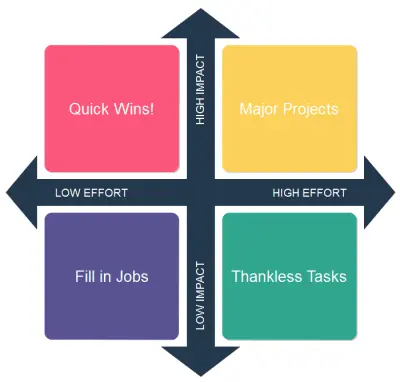
(Source: https://www.edrawsoft.com/impact-effort-matrix-templates.html)
iii. We have to assume you have done thorough competitor analysis & research.
But when it comes to analysing an app, we have totally different perspectives. And rightly so! Why else would you hire us to develop your app?
In order to be reasonably accurate with our software estimates, we have to account for both technical & business perspectives (think continuity, scalability, process engineering, payments, refunds, etc). Conversely, it’s not uncommon for new client enquiries to have only seen an app from the consumer perspective (i.e. punch in your destination address and click "Confirm UberX").
This comes back to the "below sea level" functionality versus the tip of the iceberg from #1.
From the consumer perspective, estimating how much it costs to build an app with a single simple function might seem straightforward. But it's totally different from the software engineering and business perspectives.
If you want an accurate software cost, we have to take into account all the automated programs that do the heavy lifting that give the consumer that feeling of simplicity. And that's where the value is, which builds your competitive advantage.
This technical gap and the business-oriented thinking is how Codevate differentiates itself from its competitors. When you hire us, you're getting more than just a "team of coders" — we're a team of business-oriented software developers and entrepreneurs.
And if you like the sound of that, you can send us a message here.
The next three follow-up questions should give you some insight into why those assumptions make sense from a software development/business perspective.
i. Can you develop an app like [Uber] for my business?
Uber has been quite a disruptive technology company, taking market share away from many local taxi and private hire companies, and subsidising their drivers' pay after pricing themselves quite aggressively. So it's not uncommon for West Midlands or Birmingham-based companies to make this very specific enquiry.
Generally, if it already exists, we can most definitely develop the software and customise it to your business and customer needs.
But if you're going to develop a clone (or take "significant creative inspiration from") an already-developed app, the trick is making your offering unique. You'll want to deliver more value than the original, or tailor the offering to a specific demographic, etc.
ii. Have you developed an app like this before?
This follow-up is quite a commonly asked question in general.
Having been in the software development business for the last 7 years, our company has solved (at least) hundreds of specific business cases in various ways, and seen the rise and fall of many kinds of technologies.
Whilst we may not have developed an exact clone of your competitor's software, we've likely worked with the technologies or similar use cases in the past.
As we've digitally transformed businesses large and small, I'd be willing to bet that we have high feature alignment with previous projects and your new and innovative app idea.
For some, that might sound like it's not worth developing a bespoke app for their business, as "it's all been done before". But don't worry — the value of your app will be more than the sum of its parts, and comes from your USPs, business case, and marketing.
Our answer is almost always "not quite, but close!" followed by a few demos on a Zoom, Teams, or Skype call. You can request a callback here if you'd like to find out more.
iii. Can I just have/buy a copy of the app you've already developed?
This is a question of intellectual property (IP). As we're a bespoke software development company, 99% of the time we're developing software for our clients. That means we're assigning the IP one way or another through licences or an IP transfer.
If this were the case, there would be a much lower-barrier-to-entry for "becoming the next Uber", meaning less market share for each new competitor that crops up, and therefore less reason to do so. It's a bit of a vicious cycle.
Ideally you'll want your new bespoke software to have its own unique selling points (USPs), meaning taking a like-for-like copy probably wouldn't cut the mustard.
A good way to ensure your USPs and differentiators are captured is through a Project Discovery Workshop. We usually host these at our offices in Birmingham, West Midlands, but we're doing them via Google Meet or Zoom given the current remote working situation.
This final question is a toughie to suggest useful alternatives for, so my advice is to provide as much information as possible, and to start small and work your way up.
Developing your app step-by-step is the best way to stay on top of costs, take advantage of newly discovered opportunities, and pivot to new features or markets when your customers offer up crucial insights along the way.
Hopefully you're feeling a little more in-the-know now and ready to get your quote from your chosen UK app developer. If I haven't covered the questions you have in this article, feel free to get in touch and talk to me in real-time.
You can follow us on Instagram, Twitter, and Facebook at @Codevate to get more insights like these. If you found this article useful don't forget to share it with your friends and colleagues.
Related posts
How to get your money's worth in your app development quote
Ask the right questions and focus on value!
Do you need senior software developers on your project?
Learn how we select the right people for the job.
Fast track your bespoke software project with us
"Codevate was the only company who ‘got’ our idea. We’ve worked with them to incrementally digitise most of our business processes with bespoke software."
- Complimentary scoping call
- At-a-glance feasibility analysis
- No obligation high-level proposal
- Work with an expert to evolve your idea